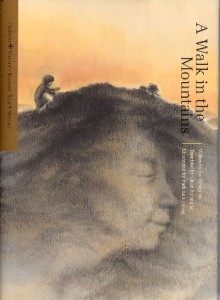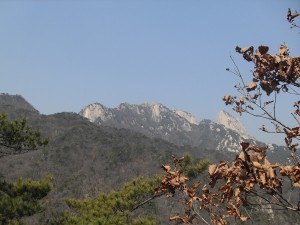A Walk in the Mountains by So Young-en is a tricky work. It features a married couple on two entirely different arcs, and is written well enough, that is both characters are believable, that it can be read with sympathy for either of them, or both. The husband, a struggling writer, is at a confused point in his life an on a path that, we eventually see, leads to a kind of Buddhist renunciation of the things of life. The wife, a struggling homemaker, is confused as her husband draws away from her as well as all the things his life had previously been premised on. Her arc, for several reasons, turns out to be the more brutal, and perhaps even unforgivable one (although there is plenty of room for argument there).
The book begins with the apparently semi OCD housewife involved in an ongoing struggle with utility bills, “From the moment I open my eyes in the morning , I feel like I’m caught up in a competition with all the utility meters … running incessantly and without a sound.”
Her obsession is somewhere in the overlap between painful and amusing. She explains the genesis of this semi-obsession in the observation, “As for me, I was ready to face poverty when I agreed to marry a writer, so I didn’t complain all that loudly.” She presents this as a sacrifice at the outset, but by the end it turns out to be something a bit different.
 She also seems temperamental at times. When her husband quits his job to become a full-time writer she cries because she believes it eliminates her dream of owning a house, although it is her desire that he be a writer, then when he does buy a house (and in Gangnam at that!), she becomes equally upset that he has done so hastily. This is put in a bit of perspective in a flashback in which she recounts her husbands various impecunities in the past. As noted, the house is in Gangnam and this seems to mean the husband has, for once, made a wise decision. As it turns out, the house has heating problems so serious that the entire tenancy is on mortgage strike, and this adds to her problems. That the house is closer to a villa (a few stories) than an apartment building, seems to also upset her.
She also seems temperamental at times. When her husband quits his job to become a full-time writer she cries because she believes it eliminates her dream of owning a house, although it is her desire that he be a writer, then when he does buy a house (and in Gangnam at that!), she becomes equally upset that he has done so hastily. This is put in a bit of perspective in a flashback in which she recounts her husbands various impecunities in the past. As noted, the house is in Gangnam and this seems to mean the husband has, for once, made a wise decision. As it turns out, the house has heating problems so serious that the entire tenancy is on mortgage strike, and this adds to her problems. That the house is closer to a villa (a few stories) than an apartment building, seems to also upset her.
In the meantime, her husband begins to act inexplicably, withdrawing from more or less everything. Eventually, he gets ill and sees a doctor, at whose office he remarks: “I know that somewhere inside there is a part of me that is brimming with plenty of unused energy. I also know it will never be released for the same purposes as it once was. As soon as I find something abut which I can say, ‘this is it,’ the energy will explode like a volcano.” (90) When his current writing job expires, he withdraws from writing entirely and begins to turn to the spiritual. He becomes infatuated with Shamanism, then a kind of Buddhism, and throughout the middle of the book he struggles with his desire to renounce all things.
This desire leads to several painful discussions with his wife who, understandably, thinks their marriage is not just something to renounce. In one of these discussion he admits his plan, “When I rid my mind even of my compassion for you, then I’ll be done with all the suffering there is for me.” (172) He seeks a different way, even betraying his own intellectuality (one of the things his wife prizes in him): I used to try to understand everything happening in the world with reason and I thought that what my head could not make sense of wasn’t worth understanding. (160)
This drives the wife a bit insane, and she humiliates herself by getting caught committing a meaningless crime.
Finally, the husband travels to a mountain range where he has a strange epiphany (after a classic “climb the mountain” message from a monk) and returns home a man without pretension. He takes a job as a gardener, and this act strips bare the last pretension of the wife, in an ending that I won’t spoil. Suffice it to say that it is not a happy thing.
This book is from the excellent Hollym “Modern Korean Short Stories” collection, and like all of the works in this collection it has English and Korean text, as well as excellent illustration, in this case from Pak Eunyong. As usual (or at least I’ve noticed it before^^ in Hollym issues) there seems to be a slight disconnect between the translation and the “literary comments” at the end of this book. Absurdly, the comments claim that the author’s trip to the mountain “revives his passion for writing,” before coming to its senses in the very next sentence and admitting, “What is important to him now is not writing.” Perhaps worse, the comments say that the author “denies reality and adopts mysticism.” In fact, the author is throwing off the mysticism of arid intellectuality, through religious mysticism (the two differences, “through” and religious, are important), on his way to a rock-bottom reality.
Still, another excellent work from a solid imprint.




